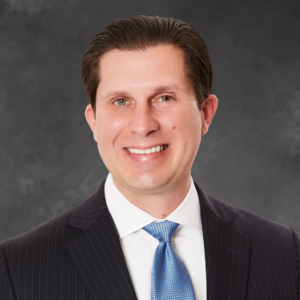
Thinking About Selling Your Healthcare Practice? Read This First.
At Beaird Harris, we understand that selling a medical or dental practice isn’t just a financial decision—it’s a deeply personal one. After years of serving…


“The important thing about an investment philosophy is that you have one you can stick with.”
– David Booth
Founder and Executive Chairman
Dimensional Fund Advisors
Combining an enduring investment philosophy with a simple formula that helps maintain investment discipline can increase the odds of having a positive financial experience.
An Enduring Investment Philosophy
Investing is a long-term endeavor. Indeed, people will spend decades pursuing their financial goals. But being an investor can be complicated, challenging, frustrating, and sometimes frightening. This is exactly why, as David Booth says, it is important to have an investment philosophy you can stick with, one that can help you stay the course.
This simple idea highlights an important question: How can investors maintain discipline through bull markets, bear markets, political strife, economic instability, or whatever crisis du jour threatens progress towards their investment goals?
Over their lifetimes, investors face many decisions, prompted by events that are both within and outside their control. Without an enduring philosophy to inform their choices, they can potentially suffer unnecessary anxiety, leading to poor decisions and outcomes that are damaging to their long-term financial well-being.
When they don’t get the results they want, many investors blame things outside their control. They might point the finger at the government, central banks, markets, or the economy. Unfortunately, the majority will not do the things that might be more beneficial-evaluating and reflecting on their own responses to events and taking responsibility for their decisions.
e+r=o
Some people suggest that among the characteristics that separate highly successful people from the rest of us is a focus on influencing outcomes by controlling one’s reactions to events, rather than the events themselves. This relationship can be described in the following formula:
e+r=o (Event + Response = Outcome)
Simply put, this means an outcome-either positive or negative-is the result of how you respond to an event, not just the result of the event itself. Of course, events are important and influence outcomes, but not exclusively. If this were the case, everyone would have the same outcome regardless of their response.
Let’s think about this concept in a hypothetical investment context. Say a major political surprise, such as Brexit, causes a market to fall (event). In a panicked response, potentially fueled by gloomy media speculation of the resulting uncertainty, an investor sells some or all of his or her investment (response). Lacking a long-term perspective and reacting to the short-term news, our investor misses out on the subsequent market recovery and suffers anxiety about when, or if, to get back in, leading to suboptimal investment returns (outcome).
To see the same hypothetical example from a different perspective, a surprise event causes markets to fall suddenly (e). Based on his or her understanding of the long-term nature of returns and the short-term nature of volatility spikes around news events, an investor is able to control his or her emotions (r) and maintain investment discipline, leading to a higher chance of a successful long-term outcome (o).
This example reveals why having an investment philosophy is so important. By understanding how markets work and maintaining a long-term perspective on past events, investors can focus on ensuring that their responses to events are consistent with their long-term plan.
The Foundation of an Enduring Philosophy
An enduring investment philosophy is built on solid principles backed by decades of empirical academic evidence. Examples of such principles might be: trusting that prices are set to provide a fair expected return; recognizing the difference between investing and speculating; relying on the power of diversification to manage risk and increase the reliability of outcomes; and benchmarking your progress against your own realistic long-term investment goals.
Combined, these principles might help us react better to market events, even when those events are globally significant or when, as some might suggest, a paradigm shift has occurred, leading to claims that “it’s different this time.” Adhering to these principles can also help investors resist the siren calls of new investment fads or worse, outright scams.
The Guiding Hand of a Trusted Advisor
Without education and training-sometimes gained from bitter experience-it is hard for non-investment professionals to develop a cogent investment philosophy. And even the most self-aware find it hard to manage their own responses to events. This is why a financial advisor can be so valuable-by providing the foundation of an investment philosophy and acting as an experienced counselor when responding to events.
Investing will always be both alluring and scary at times, but a view of how to approach investing combined with the guidance of a professional advisor can help people stay the course through challenging times. Advisors can provide an objective view and help investors separate emotions from investment decisions. Moreover, great advisors can educate, communicate, set realistic financial goals, and help their clients deal with their responses even to the most extreme market events.
In the spirit of the e+r=o formula, good advice, driven by a sound philosophy, can help increase the probability of having a successful financial outcome.
1. Jack Canfield, The Success Principles: How to Get from Where You Are to Where You Want to Be (New York: HarperCollins Publishers, 2004).
Adapted from “E+R=O, a Formula for Success,” The Front Foot Adviser, by David Jones, Vice President and Head of Financial Adviser Services, EMEA. Dimensional Fund Advisors LP is an investment advisor registered with the Securities and Exchange Commission. Past performance is no guarantee of future results. There is no guarantee investment strategies will be successful. Investing involves risks including possible loss of principal. nvestors should talk to their financial advisor prior to making any investment decision. There is always the risk that an investor may lose money. A long-term investment approach cannot guarantee a profit. All expressions of opinion are subject to change. This article is distributed for informational purposes, and it is not to be construed as an offer, solicitation, recommendation, or endorsement of any particular security, products, or services.
Please remember that past performance may not be indicative of future results. Different types of investments involve varying degrees of risk, and there can be no assurance that the future performance of any specific investment, investment strategy, or product (including the investments and/or investment strategies recommended or undertaken by Beaird Harris Wealth Management, Inc.), or any non-investment related content, made reference to directly or indirectly in this blog will be profitable, equal any corresponding indicated historical performance level(s), be suitable for your portfolio or individual situation, or prove successful. Due to various factors, including changing market conditions and/or applicable laws, the content may no longer be reflective of current opinions or positions. Moreover, you should not assume that any discussion or information contained in this blog serves as the receipt of, or as a substitute for, personalized investment advice from Beaird Harris Wealth Management, Inc. To the extent that a reader has any questions regarding the applicability of any specific issue discussed above to his/her individual situation, he/she is encouraged to consult with the professional advisor of his/her choosing. Beaird Harris Wealth Management, Inc. is neither a law firm nor a certified public accounting firm and no portion of the blog content should be construed as legal or accounting advice. A copy of the Beaird Harris Wealth Management, Inc.’s current written disclosure statement discussing our advisory services and fees is available for review upon request.

At Beaird Harris, we understand that selling a medical or dental practice isn’t just a financial decision—it’s a deeply personal one. After years of serving…

Now that another tax season is in the rearview mirror, what lessons can you take from this year’s filing experience to strengthen your financial future?

Proper classification of meal expenses can help businesses maximize deductions while staying compliant with IRS regulations. Here’s what business owners need to know: 1. 50%…
Schedule a complimentary call today. We’ll help you get started and learn more about Beaird Harris.